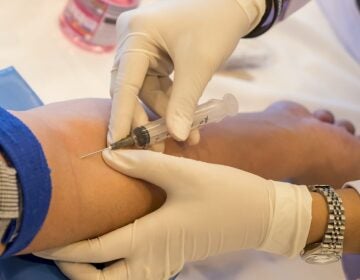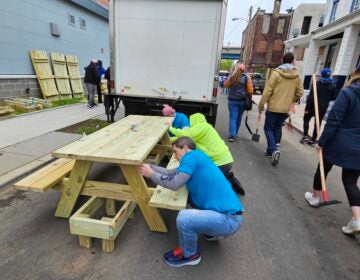Green initiatives highlighted in Manayunk
Eco Arts Festival showcases green ideas on Main Street
Spectators gathered around the waist-high tank of murky, yellow water pumped directly from the Manayunk Canal.
Hunched over to peer inside, their body language told of disgust and disbelief. A series of plastic tubes snaked between the tanks and connected to a massive solar panel pumping station.
Next to the raw canal water stood another tank of clear, drinking water, showcasing the water after being filtered and treated by The Essential Element’s Hydra technology.
Brad Carlson, chief operating officer for the Mertztown-based The Essential Element, spent all day offering festival goers free water. Almost always, he says, they drank.
Carlson along with a slew of sustainable-minded entrepreneurs, business owners and artists from the Philadelphia area and around the East Coast attended this year’s first-annual Eco Arts Festival in Manayunk.
Main Street in Manayunk is already home to a string of galleries, clothing and jewelry boutiques, fitness studios, and a worldly palate of bars, restaurants and breweries. The EcoArts Fest merged the creative with sustainable.
See slideshow below
Kelicia Pitts, of Southwest Philadelphia, attended the festival to support Save Some Green, a Center City-based boutique owned by her friend.
“Manayunk was a nice choice and it seemed like the businesses were happy to have us there as well, they all got involved,” Pitts said.
Festival goers could browse Chinese water color paintings, sift through recycled jewelry or try striking a few poses with their partners for couples’ Yoga while listening to rapper Schoolly D and a steady rotation of musical guests perform on stage.
Or, they could indulge in a refreshing sip from the Manayunk canal, courtesy of Brad Carlson and The Essential Element. Carlson says he designed the Hydra for natural disasters. In floods, hurricanes, and earthquakes, he says, people need electricity and drinking water, fast.
The Hydra’s water filtration process is powered by solar panels, which produce hydrogen that is stored in fuel cells and converted into electricity—of which, 70-percent remains as a surplus that can be fed to outside sources as needed.
“If this unit was available during Katrina we could have used it at the Superdome and they would have had shower water,” Carlson says. “We wanted to provide drinking water for emergencies without a mountain of plastic bottles.”
Adapting to energy trends
While the aftermath of Katrina could have presented opportunities for Carlson, it had one South Jersey native debating a career change.
When the disaster hit in 2005, Jim Fenton was working for an oil heating company. As the price of oil grew more volatile, Fenton’s clientele base began to shrink.
“People with oil and heat started jumping ship,” Fenton says. So he too jumped.
Fenton now works as a consultant for Greenspring Energy in Reading, Pennsylvania. In its three years of operation, Fenton says the company has installed approximately 800 solar energy generators throughout the company’s coverage zone in Pennsylvania, Virginia and Maryland.
While representing Greenspring Energy during the EcoArts Festival in Manayunk, Fenton says he enjoyed showing people how they can work within their budget to invest in sustainable energy.
In the two days of the festival, Fenton says he made 20 business leads.
“They were surprised by how much it saved them and how much it was the same from their bills,” Fenton says. “It’s kind of like buying a car and getting 50- percent back on it. It pays for itself within 5.5 years.”
Showcasing sustainable efforts on wheels
Michael Burke, who lives in Ambler and teaches ninth-grade math in Abington, co-founded Bambusa Skateboards in May. As a lifelong skateboarder, Burke builds and sells skateboards made from 70-percent bamboo and 30-percent maple wood.
“It takes 30, 40 years for maple to re-grow and be mature enough to chop down for wood. Bamboo grows back in three to five years,” he says. “Kids who ride them say the pop is incredible, because they [jump] and it snaps back and it is less likely to brake. It bends before it breaks.”
Those lacking the finesse for skateboarding enjoyed one of James Hammarhead’s customized electric motorcycles.
Having set up shop in Center City less than a year ago, Hammarhead has created a fully battery-powered prototype with his Volta model. He combined the red, vintage body of Royal Enfield motorcycle—a British brand that dissolved in 1971—powered by a 102-volt battery.
The Volta has the familiar look and feel of a classic bike, Hammarhead says, but performs faster, quieter and smoother.
“We just wanted to build a really cool bike at first,” Hammarhead says. “It’s a simple, durable product that’s still green, and we like to reuse stuff.”
Promoting green growth at home
Jared Lucas, 29, co-founded Urban Ecoforms this year to provide green roofing and green wall designs. Lucas had been inspired by similar green roofing designs in Paris, where he had studied as he pursued his master’s in environmental sciences at the University of Pennsylvania for two years.
Green rooftops absorb 100-percent of the first inch and a half of rain water, Lucas says, so it reduces storm water service bills.
“We can improve upon existing designs. In the urban environment, it is based on a premium, people don’t have as much space as they would like in the rural setting,” Lucas says.
Lucas spent most of the Manayunk EcoArts Festival cutting slits in a layer of polyester felt, where he placed tropical ferns inside for his vertical green wall on display. A hydroponic system circulates water to the ferns. And they grow in the shade, thus making them a sort of living, breathing decoration for indoors.
Like Lucas’ ferns growing on rooftops and walls, sustainable niches are springing up in Philadelphia. Whether these environmental business ventures will be sustained by sales is yet to be seen.
WHYY is your source for fact-based, in-depth journalism and information. As a nonprofit organization, we rely on financial support from readers like you. Please give today.




